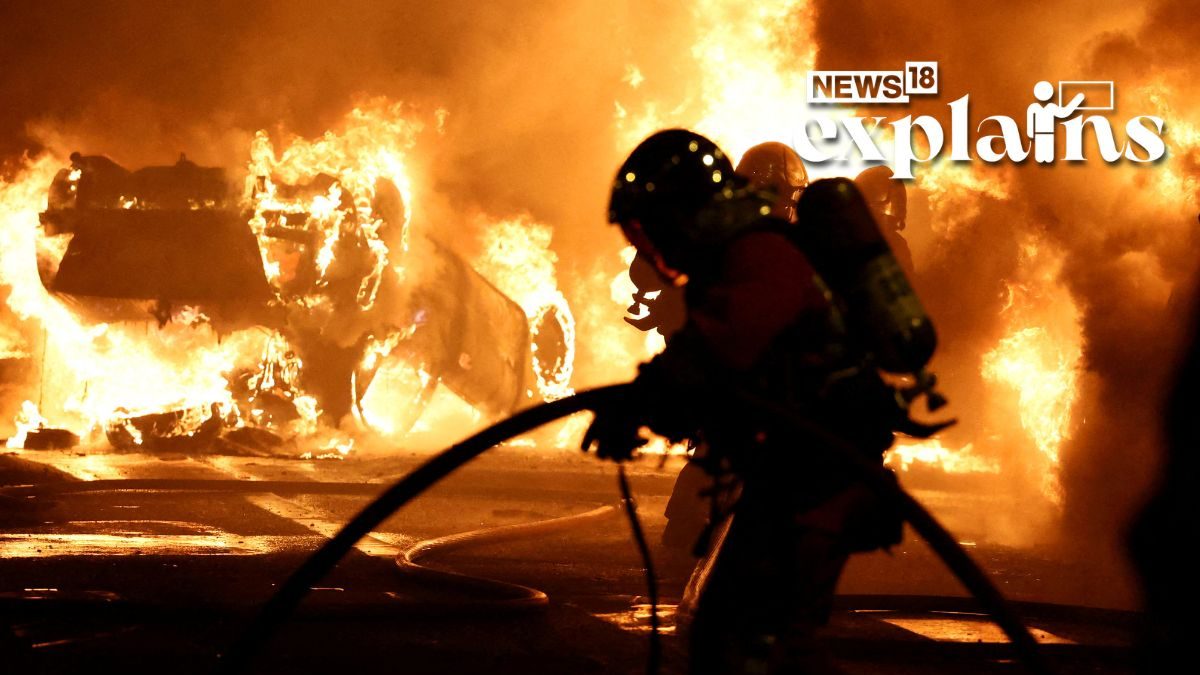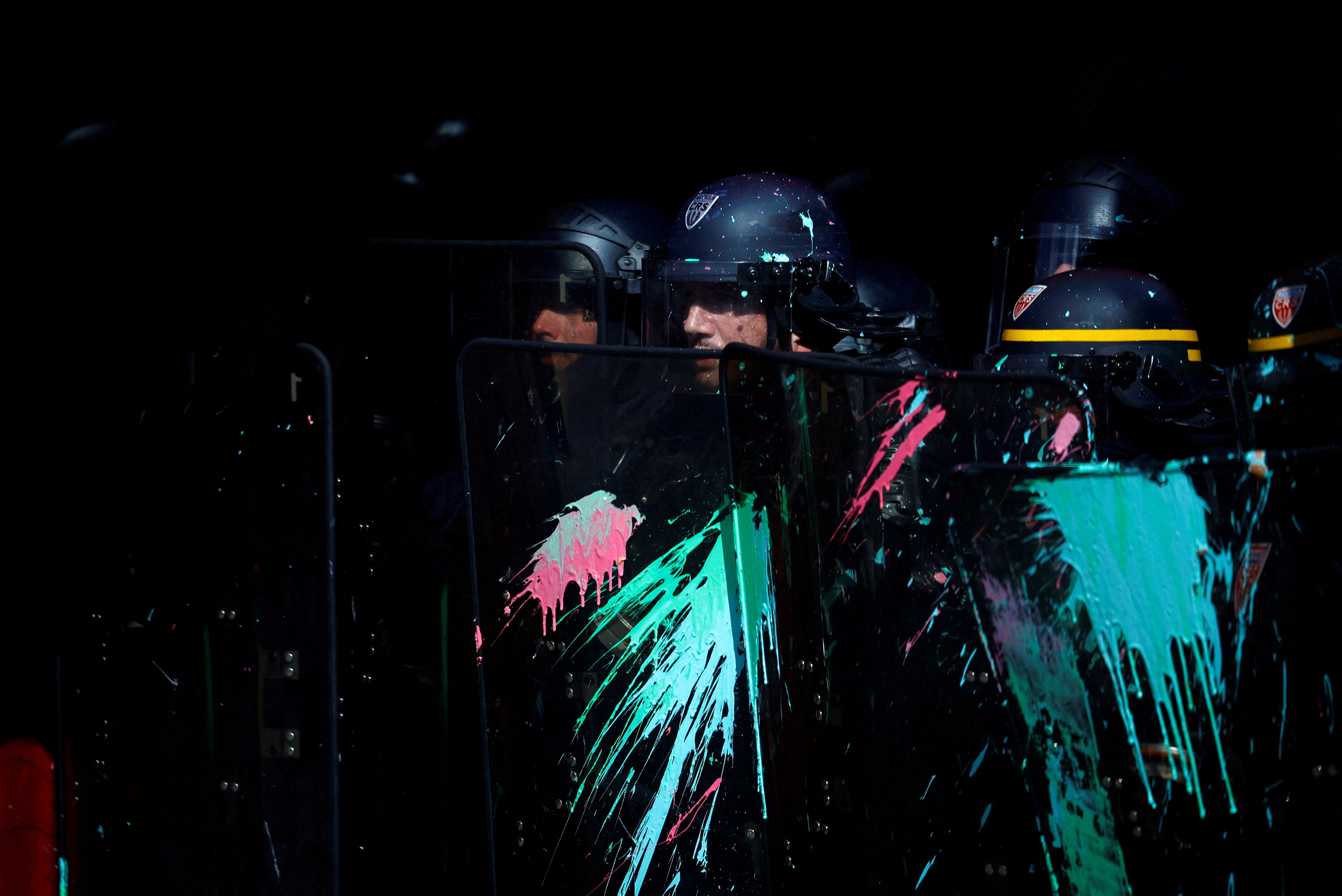France Riots: Did Nahel’s Death Shed Red on France’s Colour-Blindness to Racial Bias? – News18
Hundreds of mourners from France’s Muslim community, filled with grief and evident anguish, created a somber procession from a mosque to a hillside cemetery on Saturday. They came together to lay to rest a 17-year-old whose tragic death at the hands of the police has sparked days of rioting throughout the country.
The severity of the situation was emphasized by President Emmanuel Macron’s decision to cancel an official trip to Germany due to the ongoing unrest in France, as per Associated Press.
To prevent a fifth night of violence, the government deployed 45,000 police officers to the streets of cities nationwide. In a tweet, Interior Minister Gerald Darmanin stated that the night had been relatively calmer compared to previous ones. He said 427 arrests were made during the course of the night.
What Caused the Protests?
The protests were sparked by the shooting death of a teenager named Nahel, who had Algerian heritage, during a traffic stop in the Paris suburb of Nanterre, according to CNN.
A video of the incident recorded by a bystander showed two officers standing by the driver’s side of the car, with one of them firing his weapon at the driver despite no immediate apparent threat. The officer claimed he shot because he feared the teenager would run someone over with the car.
The actions of the officer were deemed potentially illegal, and he is currently under investigation for voluntary homicide. He has been placed in preliminary detention as part of the investigation, according to CNN.
What Has Happened Since?
Since Nahel’s death, protests have erupted with demonstrators holding signs that highlight police killings. Numerous government buildings have been damaged in the unrest, as anger over racial bias in the country has been ignited.
In response to the violence, French officials have launched a crackdown, mobilizing over 40,000 police officers to patrol cities nationwide. Since Tuesday, more than 2,000 people have been detained, and over 500 police officers and gendarmes have been injured. In Paris alone, 5,000 security personnel were deployed, with additional powers granted to officers to restore order and make arrests, as stated by French Interior Minister Gerard Darmanin.
The protests have also extended to overseas French territories, where violent demonstrations have taken place. In the capital of French Guiana, Cayenne, a man was killed by a stray bullet during the riots. In Réunion, a French territory in the Indian Ocean, at least 28 people have been detained in connection with the riots, according to local authorities.
France and Racial Bias
France has often earlier witnessed a resurgence of public debates surrounding race and racism. Several significant events have contributed to this discourse. One such event was the beheading of school teacher Samuel Paty in October 2020, which occurred in a banlieue (suburban outskirt) north of Paris. This tragic incident brought issues of extremism and religious tensions to the forefront of public attention.
Another incident that sparked controversy was the beating of Michel Zecler, a forty-one-year-old Black music producer, by four police officers in Paris in November. The incident was captured on video, leading to widespread outrage and calls for police accountability.
These events have led to discussions on the influence of Anglo-American or US conceptions of race and racism being imported into the French context, as per the Georgetown Journal of International Affairs.
As per the report, discussing race remains a sensitive and often taboo topic in the country. The French state has historically pursued a policy of universalism, emphasizing equality and citizenship while downplaying or even denying the existence of racial or ethnic differences.
However, research has shown that France shares similarities with the United States regarding the acknowledgment and denial of differences based on race and ethnicity. In both contexts, there is a complex interplay between recognizing and dismissing racial and ethnic disparities.
‘Colourblind to Racism’
Since the Second World War, France has undergone significant demographic changes, becoming an ethnically diverse country. Currently, around five percent of the French population is non-European and non-white. While this percentage is lower than that of non-white citizens in the United States, which ranges from 15 to 25% when considering how Latinos are classified, it still amounts to at least three million people. As a result, issues related to ethnic diversity have become prominent on the French policy agenda.
Contrasting with many other advanced industrialized countries, France has adopted a distinct approach to addressing ethnic issues, according to a report by Brookings. The country adheres to a “color-blind” model of public policy, which means that it does not specifically target policies towards racial or ethnic groups. Instead, France utilizes geographic or class criteria to tackle social inequalities. However, since the early 1970s, France has developed an extensive repertoire of anti-racist policies.
Traditionally, French policies have primarily focused on combatting hate speech, often going beyond the measures taken by their American counterparts. Comparatively, there has been relatively less emphasis on addressing issues of discrimination in areas such as employment, housing, and access to goods and services.
France’s color-blind approach and its emphasis on universalism and equality have faced criticism for failing to adequately address the specific challenges faced by marginalized racial and ethnic communities.
A Reminder Through Nahel
The killing of Nahel has brought to the forefront the deep-rooted issues of poverty, discrimination, unemployment, and lack of opportunities that persist in neighborhoods across France, particularly in areas where many residents have ancestral ties to former French colonies, like Nahel’s neighborhood.
For many residents, Nahel’s story served as a catalyst, igniting pent-up frustration and hopelessness among young people who have been grappling with various challenges. Housing shortages, joblessness, and low wages were among the concerns highlighted by Samba Seck, a transportation worker from the Paris suburb of Clichy-sous-Bois.
“Nahel’s story is the lighter that ignited the gas. Hopeless young people were waiting for it. We lack housing and jobs, and when we have (jobs), our wages are too low,” Samba Seck, a 39-year-old transportation worker in the Paris suburb of Clichy-sous-Bois told Associated Press.
Clichy-sous-Bois was the epicenter of the riots in 2005, triggered by the deaths of two teenagers who were electrocuted while fleeing from the police. The incident occurred in the same housing project where Seck lived. The current violence targeting Clichy and other areas has been met with mixed feelings among residents, who express both frustration and empathy. They lament the destruction caused by the rioters while highlighting their own already precarious socioeconomic circumstances.
The fear of police violence is also prevalent among the younger generation, contributing to their anger and disillusionment. Many feel that they are trapped in a cycle of poverty and marginalization, with limited prospects for improvement.
Although the crisis has escalated, President Macron has refrained from declaring a state of emergency, a measure employed during the 2005 riots. However, the government has significantly increased law enforcement presence by deploying a large number of police officers, some of whom were called back from their vacations.
In response to the unrest, France’s justice minister, Dupond-Moretti, issued a warning that young people sharing calls for violence on platforms like Snapchat could face legal consequences. President Macron has also attributed the escalation of violence to social media, further fueling concerns over its influence in these situations.
Associated Press contributed to this report
For all the latest world News Click Here



